The Free Software Movement
Our friend Dr Richard M Stallman was on good form for his talk in Leicester and gave a good thoughtful monologue for The Free Software Movement and how he came to embark on his path promoting such a cause. He briefly covered how the combination of GNU (operating system) and Linux (the kernel) came to be (please note the significance of noting “GNU/Linux” as opposed to just using the name of the kernel alone). He then followed on to cover the world of software freedom. We were entertained with a very good portrayal of his St iGNUcius avatar wry sketch, resplendent with his very old hard disk platter 🙂
See: FSF and GNU.org to see something of the great cause.
Myself, I’m somewhat concerned how he appears to be very much the lone voice and the one lone campaigner that is widely known, upon who’s efforts we all depend very deeply, and for something that is almost taken for granted for our freedoms for significant tracts of software upon which we depend. That is all a very stark contrast to the restrictions and lock-in (and enslavement?) with proprietary systems. His view is also uncompromisingly pure that is far beyond the more ‘pragmatic’ views taken by other certain leading figures for Free/Libre software ideals. He gives a convincing argument for how such ‘pragmatism’ is still restrictive and a form of enslavement, and an inevitably fatal compromise.
In true rms style, there was a brief pause for questions and discussion before he rushed onwards to his next venue, with nary a pause. Unfortunately, just as with postcards to home, a parcel of his goodies was lost trailing somewhere behind still in Europe. Hopefully that will catch up with him in time for a following talk…
The Leicester LUG met up in the Swan and Rushes for a few beers afterwards. Very good to meet the group there and there was some good thoughtful discussion. Then, I too had to rush with a mad dash sprint to catch a train back. Thanks whoever it was for the directions! 🙂 And there’s still the “binary blobs” issues and reconfigurable hardware discussions to finish!!
Hopefully we can similarly arrange another rms talk for the Nottingham LUG…
Cheers,
Martin

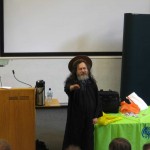
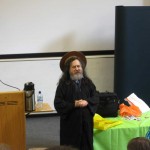
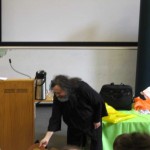
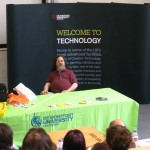
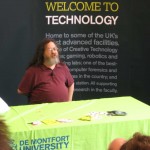
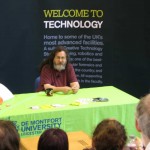
An interesting turn of openness in true The Register style:
Open source incest: GPL forked by its coauthor
In interesting commentary and idea from rms to try to limit the damage from the present patents/copyright “IP” thermonuclear meltdown that is in session at the moment across the world:
Let’s Limit the Effect of Software Patents, Since We Can’t Eliminate Them
See also the article:
Let’s Go Back to Patenting the ‘Solution,’ Not the ‘Problem’